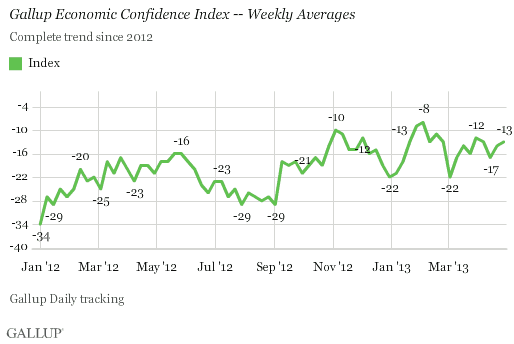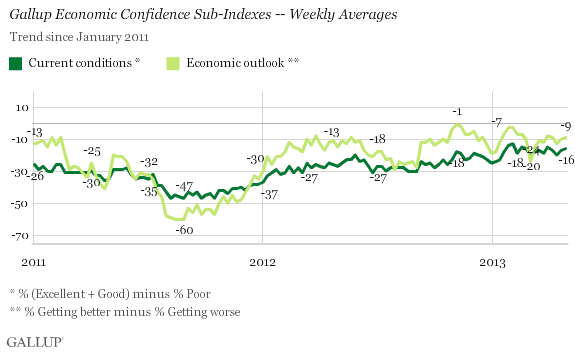WASHINGTON, D.C. -- Gallup's Economic Confidence Index was -13 for the week ending April 28, essentially unchanged from -14 the prior week. U.S. economic confidence over the past two weeks has remained at the higher end of the range seen since March, suggesting that the Boston Marathon bombings did not shake Americans' confidence in the national economy.

The current weekly score remains one of the best of the year and is five points off from the five-year high of -8 reached in early February.
Gallup's Economic Confidence Index is based on Americans' ratings of current economic conditions in the United States as well as their assessments of whether the economy is getting better or worse. Americans' assessments of both index components held steady last week.
Currently, 19% of Americans say economic conditions in the country today are excellent or good and 35% say they are poor, for a current conditions score of -16. Meanwhile, 43% say the economy is getting better, while 52% say it is getting worse, for an economic outlook score of -9
Both components are lower than they were in late January and early February but higher than they were at this same time last year. Americans' evaluations of the current state of the economy have generally been less positive this year than their assessments of the economy's future direction, which generally has been the case since December 2011.

Bottom Line
Americans' confidence in the economy has been stable in the weeks following the Boston Marathon bombings. There are positive signs that U.S. economic confidence may improve in the months ahead, such as Americans' optimism this year about home prices in their local area and their personal financial situation, compared with the past several years. Still, major improvements in Americans' confidence in the economy will likely depend on lower unemployment and more economic growth.
Gallup.com reports results from these indexes in daily, weekly, and monthly averages and in Gallup.com stories. Complete trend data are always available to view and export in the following charts:
Daily: Employment, Economic Confidence, Job Creation, Consumer Spending
Weekly: Employment, Economic Confidence, Job Creation, Consumer Spending
Read more about Gallup's economic measures.
View our economic release schedule.
Survey Methods
Results for this Gallup poll are based on telephone interviews conducted April 22-28, 2013, on the Gallup Daily tracking survey, with a random sample of 3,559 adults, aged 18 and older, living in all 50 U.S. states and the District of Columbia.
For results based on the total sample of national adults, one can say with 95% confidence that the margin of sampling error is ±2 percentage points.
Interviews are conducted with respondents on landline telephones and cellular phones, with interviews conducted in Spanish for respondents who are primarily Spanish-speaking. Each sample of national adults includes a minimum quota of 50% cellphone respondents and 50% landline respondents, with additional minimum quotas by region. Landline telephone numbers are chosen at random among listed telephone numbers. Cellphone numbers are selected using random digit dial methods. Landline respondents are chosen at random within each household on the basis of which member had the most recent birthday.
Samples are weighted to correct for unequal selection probability, nonresponse, and double coverage of landline and cell users in the two sampling frames. They are also weighted to match the national demographics of gender, age, race, Hispanic ethnicity, education, region, population density, and phone status (cellphone only/landline only/both, cellphone mostly, and having an unlisted landline number). Demographic weighting targets are based on the March 2012 Current Population Survey figures for the aged 18 and older U.S. population. Phone status targets are based on the July-December 2011 National Health Interview Survey. Population density targets are based on the 2010 census. All reported margins of sampling error include the computed design effects for weighting.
In addition to sampling error, question wording and practical difficulties in conducting surveys can introduce error or bias into the findings of public opinion polls.
For more details on Gallup's polling methodology, visit www.gallup.com.
